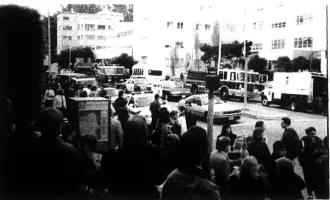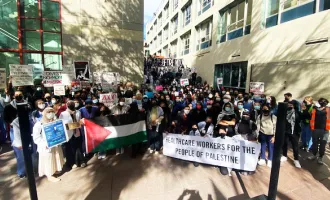The Bay Area Science Festival Highlights the Importance of Storytelling
“All science is, is rigorous storytelling,” said Adam Savage, co-host of Mythbusters. His live interview with the Inquiring Minds podcast on Oct. 28 was part of the Bay Area Science Festival’s string of events that highlighted and celebrated the role of storytelling in science. When scientists conduct their research, they often refer to their phenotype and molecular mechanism as their “story.” The Bay Area Science Festival (BASF) has shown that those stories are intertwined with personal narratives, and sharing them with the public makes science personal and accessible.
Three Minute Thesis Competition
“We must be able to explain why our work matters. And if we can do it in under three minutes, so much the better,” said Elizabeth Watkins, Dean of the Graduate Division and Vice Chancellor of Student Academic Affairs at UCSF. Introducing UCSF’s first Three Minute Thesis (3MT) Competition on Oct. 29, she stood before the standing-room only Genentech Hall, which was packed with members of the UCSF community as well as BASF attendees and science communication lovers.
The nine finalists, UCSF PhD candidates chosen by a panel of preliminary judges, had the task of describing their graduate thesis in under three minutes to a “non-specialist audience” (graduate.ucsf.edu/3MT). The finalists were: Sama Ahmed (Neuroscience), Quinn Grundy (Nursing PhD), Laurens Kraal (Bioinformatics), Freeman Lan (Bioengineering), Alison Leaf (Tetrad), Isabel Nocedal (Tetrad), Laura Simpson (Biomedical Sciences), Ivan Vujkovic-Cvijin (Biomedical Sciences), and Chuchu Zhang (Neuroscience). The final judges at the live event were: UCSF Chancellor Sam Hawgood, Dean of the UCSF School of Pharmacy Joseph Guglielmo, and science journalists Ben Lillie, Gabriela Quirós, and Indre Viskontas.
Ahmed took both first place and people’s choice prize, for a total of $3,750 in prize money, describing his work on the fruit fly’s ability to distinguish its own species from others. Deleting a single pheromone receptor, he created a fruit fly that no longer recognized species distinctions, and performed courtship dances for other fly species several times its own size.
Every one of the finalists turned their graduate career’s work into an accessible, bite-sized vignette. “Who knows, one day you may just see a yogurt that can prevent AIDS,” said Vujkovic-Cvijin, describing his work with HIV and the gut microbiome. Simpson likened microRNA control over cell biology to playing a piano chord, Leaf described complex intracellular trafficking events in terms of mailmen, gatekeepers and docks. Zhang, who was the runner-up, depicted neuronal pain mechanisms as a color palette. “Sequencing a swarm of viruses is like trying to solve one hundred jigsaw puzzles with all their pieces mixed together,” explained Lan in reference to his novel virus barcoding technique.
Other topics covered in quick succession were microfluidic studies of microbial communities (Kraal), the effects of nurses’ interactions with industry on health practices (Grundy) and the evolution of infectious yeast biofilm (Nocedal).
The 3MT competition was first developed at the University of Queensland in Australia, which also happens to be Chancellor Hawgood’s medical alma mater. 3MT will return to UCSF again next year and will be open to all graduate students who have advanced to candidacy.
Story Collider
“There is no learning at Story Collider. Science is for entertainment purposes only,” said Erin Barker, co-host of Story Collider, a live science storytelling event. Referring to herself as not a scientist, but “a civilian,” Barker recounted how she went from skepticism to excitement as she watched her co-host, Dr. Ben Lillie, first create this event in New York.
Lillie, a theoretical physicist, wanted to combine his love for science and telling stories. In these live events, speakers tell stories of how science has touched their lives: applying science skills to life, and life skills to science. Normally hosted in New York and Boston, Story Collider was brought to the Bay Area for the first time as a part of this year’s BASF.
The stories ranged from funny (applying algorithms to dating), to poignant (coming to terms with the death of a parent at an archaeological dig), to adventurous (recovering from a near-death experience with malaria in an African pygmy village), to raw and personal (coming out as transgender during marine field work in the Philippines).


